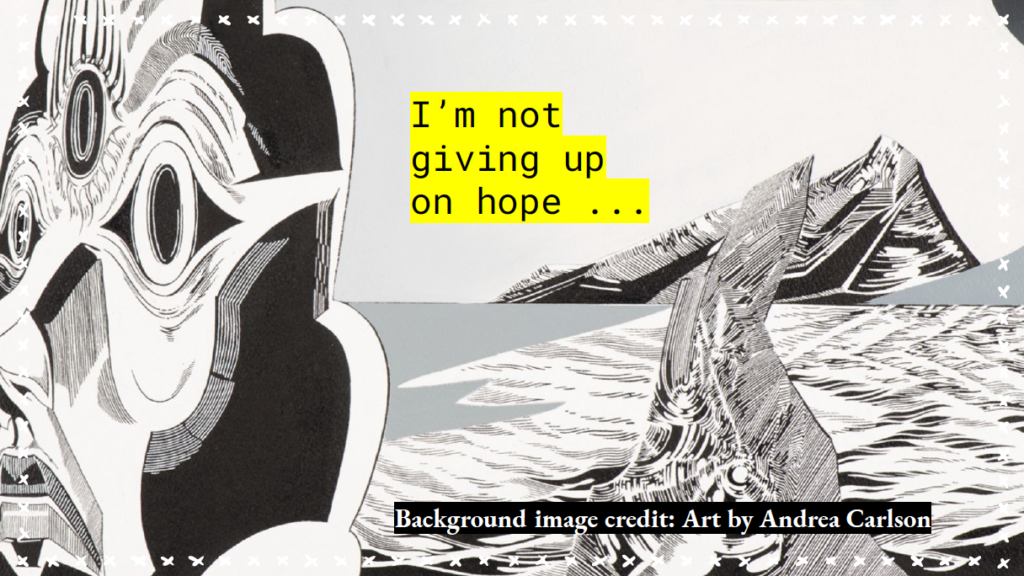My educational practices are informed by queer, trans, femme-inist, anti-colonial, anti-racist, crip and mad pedagogies and approaches to teaching/learning.

Specifically the following traits/characteristics shape my teaching practice:
CARE & LOVE: I listen to scholars, educators and activists like bell hooks, Audre Lorde, Shawn Wilson, Leah Lakshmi Piepzna-Samarasinha, Lorna Williams, among many others who advocate for care/love. I understand care and love as radical acts that are about building reciprocal relationships, being accountable to oneself and communities, and seeing everyone (including oneself) as if they have gifts and inherent value. I also see an ethic of radical care and love being one of generosity: where educators and students learn to assume the best out of themselves and others and create spaces for the challenges that come up in life.
DREAMS, DESIRES & FUTURITIES: My teaching is also rooted in thinking about the future and what could be. I like to ask people about their dreams, desires, and hopes and co-create spaces where students and teachers alike can build worlds we actually want to inhabit.
DISRUPTING OPPRESSIVE NORMS: I see schools (both K-12 schools and universities/colleges) as paradoxical sites: a place where dominant knowledges are often (re)produced, and a place where people can learn to challenge those knowledges and disrupt the status quo. I aim to help students identify and disrupt traits and logics of the following interlocking oppressive knowledges: whiteness, cognitive imperalism/coloniality, heteronormativity, cisnormativity, patriarchy, femmephobia, anthropocentrism, sanism, ableism, classism and capitalism.
RISKING ‘FAILURE’ AND ENACTING ‘RISKY’ LEARNING: In my teaching, I try to create opportunities when students can ‘fail’ and enact what Marilyn Preston (2016) calls ‘risky dialogue’ (or critical intimacy praxis). By this, I mean I think it is important that students have a space where they do not feel shamed for where they are at in their learning, but can instead use their entry points as a way to listen and integrate new knowledge holistically.
(RE)LEARNING RELATIONSHIPS TO PLACE/LAND: I try to create moments of connection to land in my teaching through activities that invite students to reflect on their story to various places. Admittedly as a white settler, I have a complex relationship to this stolen land. Over the years, and listening to Indigenous Knowledge Keepers, scholars, and youth, I have thought more about the importance of centring land in teaching and strive to continously learn how build more felt and embodied relationships with place that include learning about/respecting local Treaties and Indigenous protocols.
FINDING PEACE, SAFETY, & KNOWLEDGE WITHIN ONE’S BODY: The more I have gone and continue to go on my own personal healing journey, the more I am able to see how trauma is deeply connected to systems of oppression. I continue to learn about ways to consider the body (the sensations, affects, thoughts) that come up while teaching/learning. I want to support students in developing a literacy around embodiment as I learn one too. I likewise want to model spaces where consent is the norm (as opposed to students being told how to be in educational spaces).

For me to be the best educator, I believe I need to take good care of myself: I need to be self-compassionate, cultivate deeper reflexivity, savour moments of joy, and prioritize rest. Black feminist educator and scholar, bell hooks calls educators prioritizing wellness “engaged pedagogy”. She writes that educators must be “actively committed to a process of self-actualization that promotes their own well-being if they are to teach in a manner that empowers students” (p. 16). This is an ongoing commitment and one that requires an ongoing gentleness towards my own learning journey.